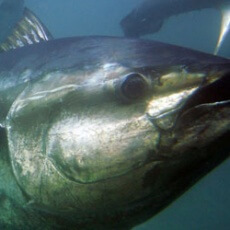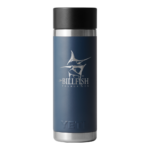The Billfish Foundation regularly represents recreational interests and discusses issues surrounding management of billfish and tuna here in US Atlantic waters. This past month, a number of important topics including regulations for both commercial and recreational fishing, new research findings, potential regulations and research needs were all discussed at two separate meetings; the Highly Migratory Species (HMS) Advisory Panel and the International Convention for the Conservation of Atlantic Tunas (ICCAT). A diverse group of participants from various sectors (academia, government, commercial and recreational) bring different perspectives, knowledge and experiences to the table, and together are vital in working towards establishing the best management practices for important HMS species.

Photo of a Fish Aggregating Device (FAD) above water. Photo courtesy of NOAA.
The ICCAT meetings bring together invited and interested stakeholders to formulate a management/policy strategy for the United States. While many topics from the international arena were discussed, the passage by Congress of the bipartisan Illegal, Unreported, and Unregulated (IUU) Fishing Enforcement Act of 2015 or the Port State Measures Agreement, the United States commits to work together with other nations to prevent illegally caught fish from entering into commerce worldwide by reducing the number of ports where these fishing products can be unloaded and making it harder for bad actors to do business.
TBF also took part in the Billfish Species Working Group to develop management and research recommendations for the consideration of the US delegation for ICCAT. The group reviewed the status of billfish stocks and the schedule for upcoming assessments and discussed current ICCAT management measures, other possible management measures, and actions from the 2015 Commission meeting.
A couple of the management recommendations were to look at the reporting from the artisanal fleets in the Atlantic and look to prohibit the international trade of overfished billfish stocks. Research recommendations stemmed from looking the socioeconomic importance of billfish from sportfishing, looking at FAD effects on the fishery and most importantly, continually collecting data and doing analysis of billfish life-history. Note that many of the basic life-history parameters of billfish are still poorly understood for all species.
Domestically at the HMS meetings, the management of bluefin tuna was also a hotly debated topic and many important issues were raised that have significant implications for not just anglers that target for bluefin, but all offshore anglers.

Bluefin Tuna. Photo courtesy of NOAA.
TBF was very active in seeing that recently established regulations for bluefin tuna kept longline fishing out of important closed zones, including the Desoto Canyon, and established additional time-area closures in the Gulf for longline fishing. In both of these zones, there have been high rates of billfish bycatch when they were previously open to longline fishing.
TBF was also active in the discussion of the National Bycatch Reduction Strategy (currently in draft form) to see that more efforts will be taken to reduce billfish bycatch both domestically and internationally. One action taken here in the states that was presented was the Deepwater Horizon Pelagic Longline Project that with restoration funds aims to compensate longline vessels for staying at the docks or switching over to alternative gear (green-stick and buoy gear) as a way to reduce bluefin tuna and billfish bycatch.
Perhaps the most important topic for anglers that was presented was an update to the HMS Recreational Tournament Surveys. In recent years, National Marine Fisheries Service (NMFS) has been making strides to quantify the economic important of HMS recreational fishing in the Gulf and Atlantic waters and now NMFS is focusing on HMS tournaments and are planning on distributing surveys to both tournament directors and participants. TBF strongly urges everyone to participate when the survey becomes available as it is only by knowing the full economic importance of HMS recreational fishing that NMFS can better manage HMS recreational fishing in a way that reflects its true significance.
Please keep up with TBF by following our newsletter and checking in at our website for updates.






